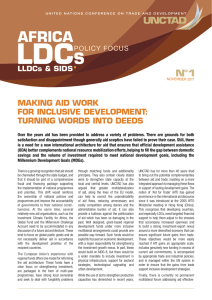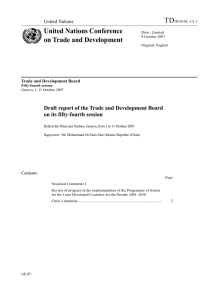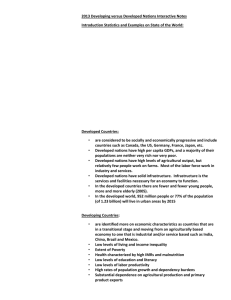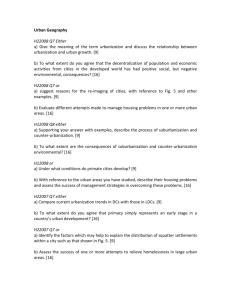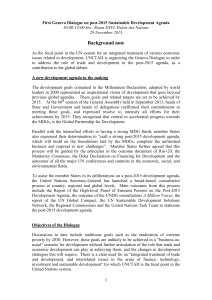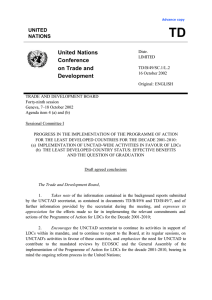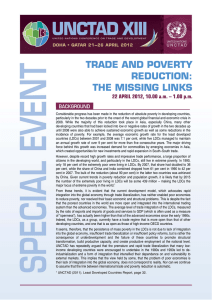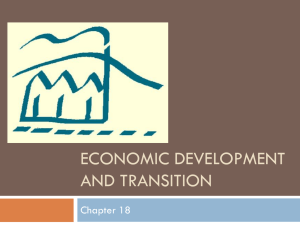TD United Nations Conference on Trade and Development
advertisement
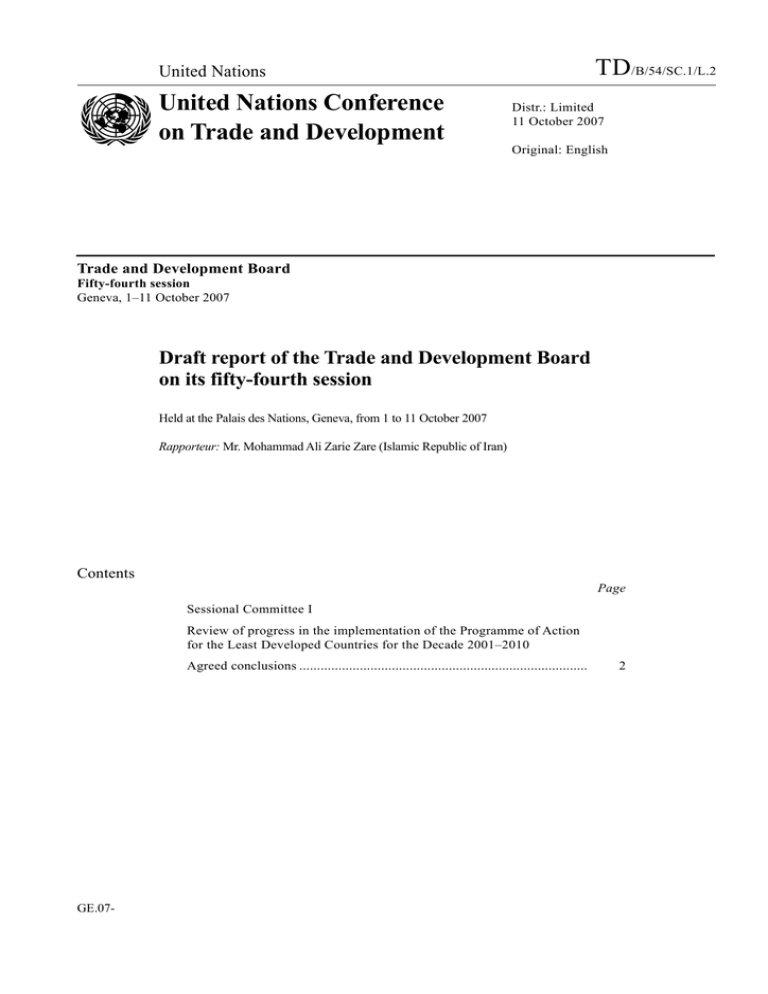
TD/B/54/SC.1/L.2 United Nations United Nations Conference on Trade and Development Distr.: Limited 11 October 2007 Original: English Trade and Development Board Fifty-fourth session Geneva, 1–11 October 2007 Draft report of the Trade and Development Board on its fifty-fourth session Held at the Palais des Nations, Geneva, from 1 to 11 October 2007 Rapporteur: Mr. Mohammad Ali Zarie Zare (Islamic Republic of Iran) Contents Page Sessional Committee I Review of progress in the implementation of the Programme of Action for the Least Developed Countries for the Decade 2001–2010 Agreed conclusions ................................................................................. GE.07- 2 TD/B/54/SC.1/L.2 Sessional Committee I Review of progress in the implementation of the Programme of Action for the Least Developed Countries for the Decade 2001– 2010 Agreed conclusions (…) The Trade and Development Board, Noting with appreciation the extensive activities undertaken by UNCTAD, within its mandate and competence, in the implementation of the Programme of Action for the Least Developed Countries for the Decade 2001–2010, as contained in documents TD/B/54/2 and TD/B/54/CRP.1, 1. Urges all stakeholders, particularly the least developed countries (LDCs), donors and the United Nations system, to redouble their efforts, in partnership, to achieve the full and effective implementation of the actions and commitments contained in the Programme of Action; 2. Recognizes the critical importance of the development by LDCs of their productive capacities through capital accumulation, technological progress, structural change and good governance to enhance their economic growth and development, to expand productive employment and reduce pervasive poverty, to reverse LDCs’ continued marginalization and to accelerate their beneficial integration into the global economy; 3. Welcomes UNCTAD’s Least Developed Countries Report 2007: Knowledge, Technological Learning and Innovation for Development, as a significant and original contribution to research and policy analysis; 4. Emphasizes that science, technology and innovation are critical in LDCs and that there is a need to identify practical national and international policies and measures that will promote technological learning and innovation in LDCs, as well as a need to support communication strategies which enhance public awareness of the role of science, technology and innovation in development and poverty reduction; 5. Stresses that LDCs should assume primary responsibility for ownership and leadership in the design and implementation of their development polices and strategies, and urges them to integrate science, technology and innovation policies into their development and poverty reduction strategies. Development partners can also play an important role in fostering technological learning and innovation through further official development assistance devoted to issues relating to the promotion of science, technology and innovation, taking into account the special needs and circumstances of LDCs and paragraph 52 of the São Paulo Consensus; 6. Emphasizes the importance of agricultural productivity growth in development and poverty reduction in LDCs and invites development partners to consider increasing official development assistance for agricultural research and extension services in LDCs; 7. Underlines the need for national and international action to generate productive employment in non-agricultural sectors in LDCs by promoting business formation and upgrading the core competences and technological capabilities of domestic firms, including through training and skills development, particularly in design and engineering, encouraging research and development, increasing the absorptive capacities of domestic firms and enterprises, leveraging more technological learning from foreign direct 2 TD/B/54/SC.1/L.2 investment and including technological development in donor-supported physical infrastructure projects; 8. Further emphasizes that for LDCs to benefit more from technology and innovation, they must endeavour to promote an enabling environment, sound macroeconomic policies and a stable, transparent and predictable business environment, in order to allow their population to participate effectively in the knowledge society; 9. Reiterates that aid for trade is an important complement to trade negotiations, in particular to the Doha development agenda, amplifying the potential benefits for developing countries. In this context, special attention should be paid to, inter alia, building domestic science, technology and innovation capacities, particularly in LDCs; 10. Acknowledges the valuable contribution of UNCTAD to the Integrated Framework and calls on it to play a proactive and more prominent role, especially in the follow-up to, and implementation of, the Enhanced Integrated Framework. In this context, UNCTAD’s divisions and programmes should be mobilized to effectively contribute to this effort; 11. Recognizes the importance of UNCTAD’s continued and expanded involvement in support of LDCs and urges the secretariat to strengthen, within existing resources, its research capacity, particularly on LDC issues, and to enhance synergies and complementarities between its research and policy analysis work on the one hand and technical cooperation and capacity-building activities on the other, and encourages the other four UNCTAD divisions to cooperate with the Division for Africa, Least Developed Countries and Special Programmes to ensure that LDCs benefit from all the divisions’ expertise, research and technical assistance services and products; requests further studies on the economics of knowledge in LDCs; and requests the UNCTAD secretariat to provide a report on cooperation and resource allocation within the secretariat in support of LDCs, in which context consideration should be given to the adequacy of resources devoted to the annual publication of the Least Developed Countries Report; 12. Expresses its appreciation to bilateral donors for their continued support and financial contributions to the UNCTAD Trust Fund for Least Developed Countries and invites them to regularly replenish and diversify the sources of funding; 13. Requests the UNCTAD secretariat to mobilize adequate financial resources to ensure the participation of LDCs in the preparatory process for the twelfth session of the Conference, UNCTAD XII, and their participation in the session itself, and invites donors to earmark extrabudgetary contributions for this purpose. 3


